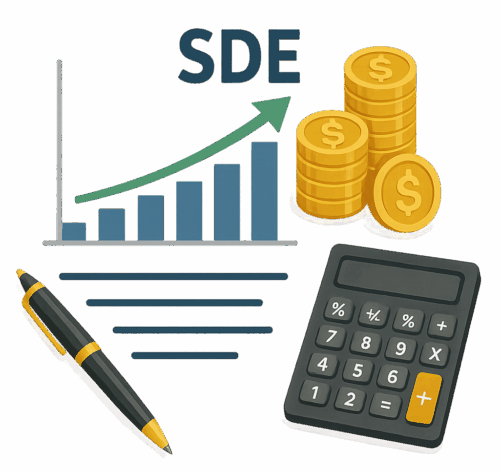How to Calculate Seller’s Discretionary Earnings (SDE)
Seller’s Discretionary Earnings (SDE) is a key metric used to evaluate the true earning power of a small business. It adjusts the net income to reflect the total financial benefit an owner-operator receives.
SDE Formula
SDE = Net Income
+ Owner’s Salary
+ Interest Expense
+ Depreciation
+ Amortization
+ One-Time or Non-Recurring Expenses
+ Owner’s Discretionary Expenses
– Non-Owner Income
+ Owner’s Salary
+ Interest Expense
+ Depreciation
+ Amortization
+ One-Time or Non-Recurring Expenses
+ Owner’s Discretionary Expenses
– Non-Owner Income
Breakdown of Components
- Net Income: Profit after all expenses as reported in the income statement.
- Owner’s Salary: Compensation paid to the owner, added back since it’s discretionary.
- Interest: Financing costs, not operational, so added back.
- Depreciation & Amortization: Non-cash expenses, added back.
- One-Time/Non-Recurring Expenses: Legal settlements, major repairs, or moving costs.
- Discretionary Expenses: Personal or non-essential business expenses (e.g., meals, travel).
- Non-Owner Income: Subtracted if generated by others not transferring with the business.
Example Calculation
| Description | Amount |
|---|---|
| Net Income | $80,000 |
| Owner’s Salary | $50,000 |
| Interest Expense | $5,000 |
| Depreciation | $7,000 |
| Amortization | $3,000 |
| One-Time Legal Expense | $6,000 |
| Discretionary Travel | $4,000 |
| Less: Passive Owner’s Share | ($10,000) |
| Total SDE | $145,000 |
Note: SDE is especially useful when valuing small businesses, as it represents the earnings available to a single full-time owner-operator.



